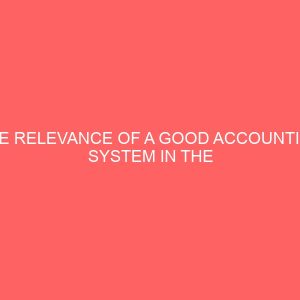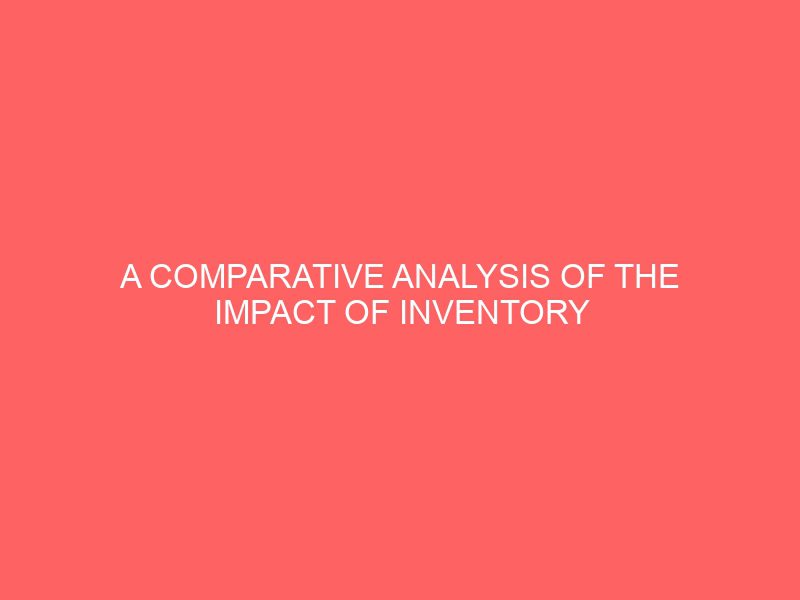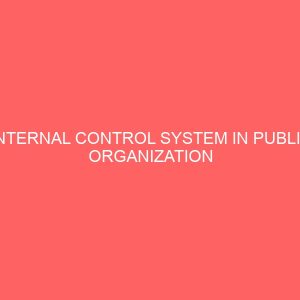Description
A COMPARATIVE ANALYSIS OF THE IMPACT OF INVENTORY VALUATION METHODS ON FINANCIAL REPORT STATEMENT ABSTRACT This research work was conducted on with special reference to the impact inventoryvaluation methods has on financial report statements of manufacturing companies. For a longtime now the Accounting profession has not been able to come up with any particular technique or method to be used uniformly in valuing inventory. This research work examined if the method used was as a result ofthe prevailing economic circumstances. A survey research design was adopted for the study; data collected weregotten from both the primary and secondary sources. An infinite population of over 3000 was used and a finite population of 220. Three hypotheses were tested at 5 percent level of significance. Tables and percentages were employed to answer the questionnaires while the statistical regression coefficient analysis and Z- test were used to test the hypotheses. It was found amongst others that the prevailing economic parameter influences the decision of choice of inventory valuation method used. The Accounting professional bodies should try as much as possible to adopt a particular method of inventory valuation and the weighted average method was recommended as a method that can withstand any economic challenges. CHAPTER ONE 1.0 INTRODUCTION 1.1BACKGROUND OF THE STUDY Inventory valuation allows companies to provide a monetary value for items that make up their inventory (stock). Inventories are usually the largest current asset of a business and are as important as funds (cash). It is a form of fund tied up in assets (current assets). It‟s proper or accurate measurement or valuation cannot be overlooked as it forms a greater percentage of an enterprise‟s current assets in particular and a total asset in general. For manufacturing companies, inventories usually represent approximately 20 to 60 percent (%) of their assets. If inventory is not properly valued, it may result that expenses and revenue may as well not be properly matched and a company could make poor business decisions that will affect the company‟s profit. It is essential the way assets are valued because it could be attributable to the numerous benefits which an organization stands to gain by keeping an accurately valued stock that meet shareholders needs, demands for financial information and also the relevant specification of a particular organization. However, it will be a waste of time if the record accuracy is poor. 11 Inventory in manufacturing company or concern comprises of the following components: § Raw materials inventory § Work- in- progress (semi- finished goods) inventory § Finished goods inventory These components show the relationship between production and sales, and it enables an organization to offer better service to its customers at a reasonable price. However, the technique or method used in the valuation of inventories varies and the values placed on inventories vary in time with the prevailing economic parameters (inflation, deflation or static economy) and it can also be influenced by the management policy of the organization. For instance, if the objective of an enterprise is that of profit maximization, it may result to the use of a particular method so as to disclose lower profit, thereby using excess fund at its disposal to expand its operations. This type of organization may discard other methods of valuing inventories in favour of the method that suit it objectives. According to Nwoha (2006:69), no area of accounting has produced wider difference in practice than the computation of amount at which inventories (stocks) and work-in-progress as stated in financial account. 12 Inventory valuation method used by an enterprise is determined by a number of reasons. These include inflation, differences in quantity discounts, frequent changes in prices of commodity, buying from different suppliers and also the nature of items or product. For instance a company that deals on perishable goods, let‟s say a grocery store, prefers an inventory valuation method that recognizes the out flow of goods that were first in stock. This arises as a result of the perish ability of the items treated and the high turnover rate could also be accounted for this choice of method FIFO (first-in, first-out). The level of the three component of the inventory stated earlier differs among organizations depending on the nature and volume of operation undertaken. Manufacturing companies have a high level of raw material inventory and semi-finished goods inventory as it is found in the grocery stores. Considering the large sums of money tied up in inventory as earlier stated, Horngren and Foster (2004:756) pointed out that it is pertinent to have an “information model” as a result of the obvious fact that if stock matters (receipts, issues and controls) are not properly handled, it would go a long way to jeopardize the financial status (liquidity) as well as the profitability position of the firm. Hence, this research work is a step in the right direction to address and highlight the role of account professional towards the achievement of choosing and adopting appropriate inventory valuation methods for each group of industry. 13 1.2STATEMENT OF THE PROBLEMS For a long time now the accounting profession has not been able to come up with any particular techniques to be used uniformly in valuing inventories. Various accounting bodies strongly recommend one method or the other. As each method used has its effect on profits and closing inventory figures. This paves way to differing tax assessments and brings about a situation whereby some organizations are over assessed (overtaxed) while others are under assessed. This also bedevils the comparability of one firm‟s performance with that of another though they may be in the same line of business when an investor is attempting to invest his capital in a firm. However, each body or organization purports being consistent with the use of certain valuation methods yet some companies adopt the method which gives them advantage over any other recommended method or method accepted by the Board of Internal Revenue, or Federal Board of Inland Revenue for tax assessment purposes. The method adopted by the companies enables them to pay less tax to the government. The problem in achieving a statutory consensus compliance method in the administration of inventory valuation by Nigerian manufacturing industry has persisted. An appropriate forum of diverse accounting professional bodies is required to reach a consensus on the issues of choosing and adopting appropriate inventory valuation methods for each group of industry. Hence, this








Reviews
There are no reviews yet.